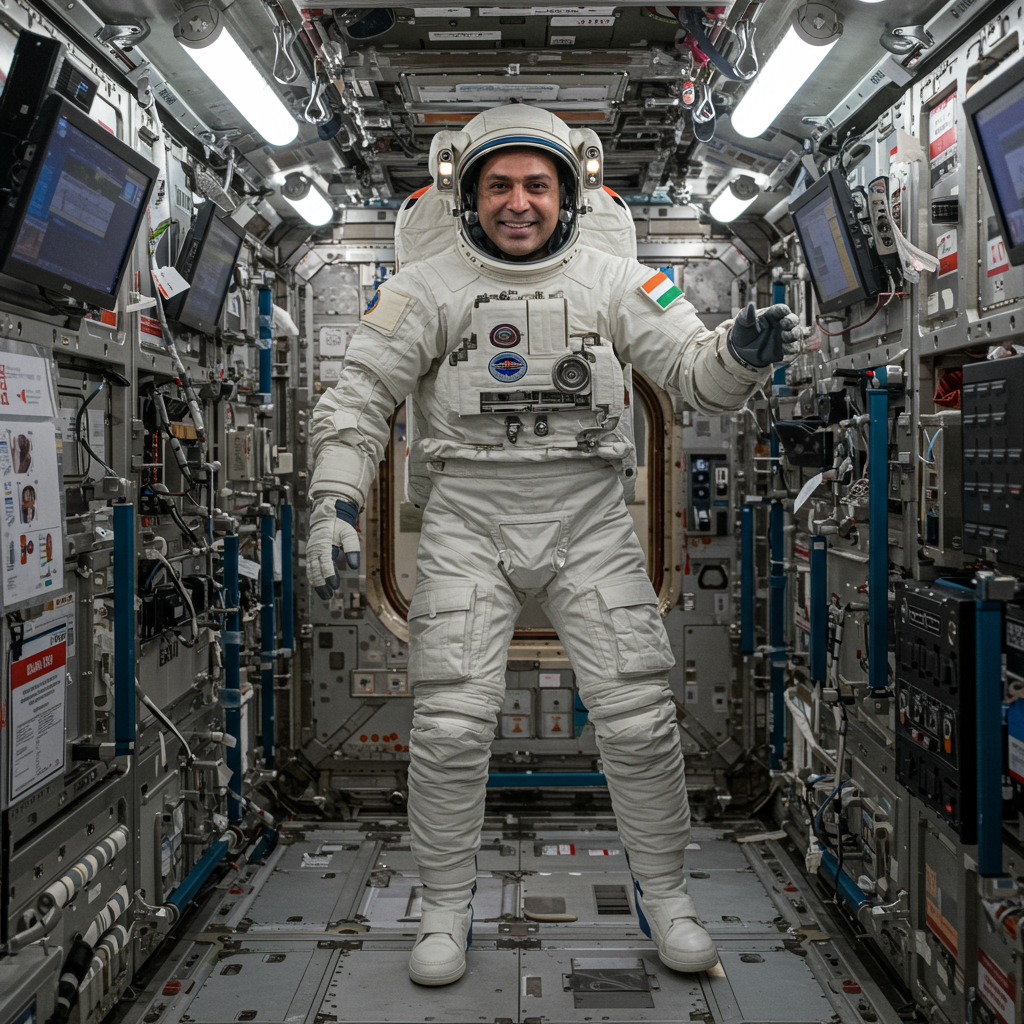A wave of national pride has swept across India following a historic moment in the country’s space journey: an Indian astronaut has successfully launched into orbit, ending a 41-year hiatus in human spaceflight participation. Group Captain Shubhanshu Shukla is part of the multinational crew aboard the Axiom Mission 4 (Ax-4), a commercial flight destined for the International Space Station (ISS).
This mission marks Group Captain Shukla as only the second Indian citizen to ever travel to space. His voyage carries particular significance as he is poised to become the first Indian to visit the International Space Station, NASA’s orbiting laboratory, upon the spacecraft’s anticipated docking just over a day after launch.
The historic flight lifted off from NASA’s Kennedy Space Center in Florida. The Ax-4 mission, a collaboration involving NASA, the Indian Space Research Organisation (ISRO), the European Space Agency (ESA), and SpaceX, is operated by Houston-based private company Axiom Space. Commanded by former NASA astronaut Peggy Whitson, a veteran with extensive space experience, the four-member crew also includes astronauts from Poland and Hungary, whose participation likewise represents their countries’ return to human spaceflight after more than four decades.
Ending a Four-Decade Gap
Group Captain Shukla’s journey follows 41 years after Wing Commander Rakesh Sharma became the first Indian to reach space in 1984 aboard a Soviet Soyuz spacecraft. This long gap highlights significant shifts – in priorities, geopolitics, and India’s focused effort to build independent space capabilities. Unlike Sharma’s mission, which relied purely on international partnership, Group Captain Shukla’s flight is intrinsically linked to India’s ambitious indigenous human spaceflight program, Gaganyaan.
India is actively developing the critical technologies needed for Gaganyaan, including successful tests of the crew escape system and high-altitude abort systems. The program plans multiple uncrewed test flights before sending Indian astronauts into space on an entirely Indian platform, with a crewed mission currently targeted for 2027. This strategic approach, coupled with established infrastructure like the dedicated astronaut training facility in Bengaluru, ensures that the wait for future Indian astronauts to go to space will be significantly shorter than the last four decades. ISRO reportedly invested 5 billion rupees ($59 million) to secure Group Captain Shukla’s seat and training on the Ax-4 mission, viewing it as a vital opportunity to gain experience ahead of Gaganyaan.
A Message from Orbit
Moments after achieving orbit, Group Captain Shukla shared a powerful message, echoing the sentiment of a nation watching with bated breath. “We’re back in space after 41 years and what an amazing ride it’s been,” he exclaimed. Holding the Indian flag aloft, he declared, “This is not the start of my journey to the ISS, this is the beginning of India’s human spaceflight.” He urged fellow Indians to feel proud and be part of this momentous journey.
The launch, carried live globally, ignited celebrations across India. Prime Minister Narendra Modi hailed the successful lift-off, stating the astronaut “carries with him the wishes, hopes and aspirations of 1.4 billion Indians.” In his hometown of Lucknow, hundreds joined his parents to witness the historic event, breaking into applause as the rocket soared skyward.
Group Captain Shukla, a 39-year-old decorated Indian Air Force fighter pilot with over 2,000 hours of flying experience on various aircraft including MiGs, Sukhois, and Jaguars, was selected for the Ax-4 mission from a group of four Indian officers undergoing training for the Gaganyaan program. His participation underscores India’s growing presence and ambition in space exploration, serving as a critical stepping stone towards its indigenous goals.
Life and Science Aboard the ISS
During their planned two-week stay aboard the International Space Station, Group Captain Shukla and his crewmates will undertake a demanding schedule. Besides his role as pilot, managing crucial phases from launch to landing, Group Captain Shukla is expected to interact with Indian students and potentially even Prime Minister Modi from orbit, reflecting the immense public interest back home.
The four-member crew will collectively conduct approximately 60 scientific experiments covering diverse fields like human research, life sciences, and material sciences. Seven of these vital experiments originate from India, focusing on expanding our understanding of space and its impact.
According to former NASA scientist Mila Mitra, these Indian experiments will significantly aid ISRO’s efforts. Key research includes:
Crop Resilience: Investigating how six different varieties of crop seeds react to the spaceflight environment.
Microalgae Studies: Growing three strains of microalgae to identify which are most suitable for cultivation in microgravity, potentially serving as future food, fuel, or life support components.
- Tardigrade Survival: Observing the survival and behavior of tardigrades, famously resilient micro-animals, in the extreme conditions of space.
- www.bbc.com
- en.armradio.am
- timesofindia.indiatimes.com
- www.arabnews.com
- www.thehindubusinessline.com
Other experiments on the mission aim to shed light on muscle loss in space and potential treatments, and the physical and cognitive effects of using computer screens in microgravity.
India’s Future in Space
Group Captain Shukla’s flight comes as India is rapidly expanding its footprint in space. Recent successes like the Chandrayaan-3 lunar landing (making India the first to land near the Moon’s South Pole) and the Aditya-L1 solar mission highlight India’s growing capabilities. The nation has outlined ambitious future plans, including establishing a space station by 2035 and targeting a crewed mission to the Moon by 2040. With significant investments, indigenous technological advancements, and a vibrant ecosystem involving key Indian firms and startups, India is poised for a future where human space missions are not separated by generations, but become a regular part of its journey among the stars.



